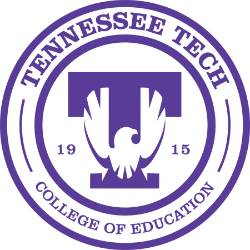Current Student Information
Forming a Committee
The student’s Ph.D. committee includes a minimum of four members. Additional committee members are optional. The committee must include a chair who has been credentialed by the university and three or more members, who must hold either associate or full graduate faculty status at Tennessee Tech. Doctoral students have the right to amend their committees by adding, omitting, or replacing members, during the process of their study and in response to their changing needs.
Filing a Program of Study
Students have primary responsibility for knowing and meeting the program requirements. Students are expected to take the initiative in planning and following their Program of Study.
The Program of Study (POS) must be turned in early in the program—during the semester the student reaches 15 completed semester hours (usually no later than the third semester after formal admission to the program).
The POS is developed in collaboration with the total committee. Each committee member must review and sign it before it is submitted to the Chair of Curriculum & Instruction and the Director of Graduate Programs. The committee and the Director of Graduate Programs must approve all changes made to the Program of Study (via Substitution Form or a revised Program of Study form, as is appropriate).
Please note: if course substitutions are made without a Substitution Form, graduation can be delayed. A course must be on the Program of Study in order to be counted toward the degree.
Keeping Up With University Policies
In addition to the Higher Education Ph.D. program guidelines, students are required to follow the Tech Student Handbook and the Graduate Catalog.
Coordinating the Dissertation Defense/Notifying Others About the Defense/Submitting Copies of the Dissertation
Ph.D. candidates should work closely with their Chairs to determine an appropriate defense date. Candidates should review the Graduate Student Calendar for the semester they intend to graduate and work back from important milestones shared via the calendar. Ph.D. candidates should apply for graduation at the beginning of the semester in which their defense is scheduled to take place.
A copy of the final dissertation draft must be submitted to all committee members and the Director of Graduate Programs no less than two weeks prior to the defense, though earlier is appreciated.
At the same time, the Ph.D. candidate should notify the Director of the defense day, time, and location. The Dissertation Defense Form is available on the Graduate Studies website. This form should be completed and brought to the dissertation defense. If the Ph.D. candidate passes the defense, the committee signs the paper and it will be routed it to the Chair of Curriculum & Instruction and Director of Graduate Programs.
Upon approval of final revisions, the Certificate of Approval is signed by the committee and submitted to the College of Graduate Studies (a copy should also be sent to the Director of Graduate Programs). An electronic PDF copy of the dissertation is then submitted to the College of Graduate Studies. Bound copies for the Chair and each committee member are courtesies, but strongly encouraged.
Portfolio
Students in the Higher Education Ph.D. program will complete a portfolio of work and then present the portfolio as their comprehensive exams. This process will allow them to demonstrate mastery of theory, research proficiency, professional skills, and content.
Through the five courses (HRED 7010, 7020, 7030, 7040, 7050), students will craft a portfolio of five key assignments as part of the Digital Writing Collaborative: 1) a position paper, 2) review, 3) literature review, 4) conference proposal, and 5) funding proposal with data visualization.
These assignments use case studies to prompt student identification of a real-world problem or concern at their respective institutions and in their specific contexts, which then becomes the guiding topic for their assignment. The assignments focus on technological innovation, leadership, and data-driven decision-making—key elements that make Tennessee Tech’s Higher Education Ph.D. unique.
Students will receive feedback on each assignment from both peers and faculty. Students must formally present their portfolio and discuss the development of the project, their understanding, and their competencies over the course of the classes. Once students have successfully competed and presented their portfolio, they may advance to Ph.D. candidacy and continue in the program. Completion of the comprehensive exam portfolio is expected by the close of the student’s second academic year.
Resources
General
College of Graduate Studies
Research & Economic Development
Institutional Review Board (IRB)
APA


